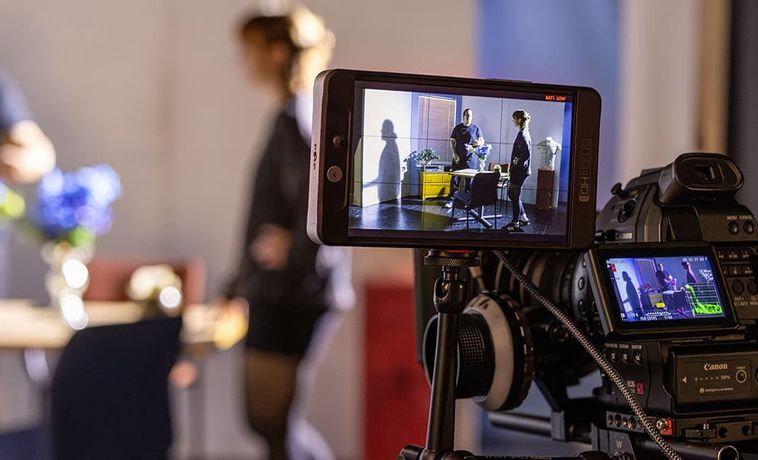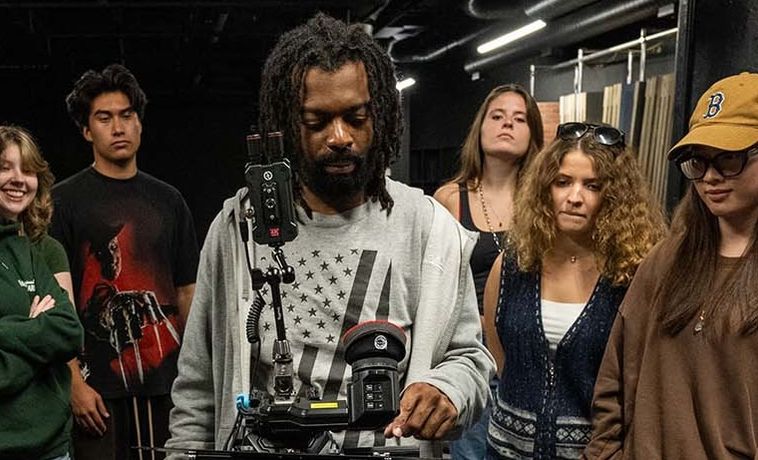Summer School for Video Storytellers
The annual Academy of Media Production gave teens a remote crash course in film and TV—and increased donor support is boosting its reach

Lexi Matthews (21) directs AMP's livestream. Photo by Ryan Gregory ('22).
For most of the past 32 years, COM’s annual Academy of Media Production has plunged high schoolers into the filmmaking business. In four intensive weeks, expert instructors give teens the opportunity to take on just about every production job, from director to voice over artist, as they produce documentaries, music videos, even zombie movies.
It’s a chance to feel the hum of anticipation when the director calls “standby” and to understand the resilience needed to keep the buzz going through numerous takes.
But how do you build that buzz, feel that hum when you’re stuck at home? In 2021, for the first time in its history, the Academy of Media Production was a remote experience. Instead of building bonds over hours of filming or slapping happy, but exhausted, high fives after a successful shoot, the students were in their bedrooms, alone.
“The challenge was to get these students in a cross-collaborative environment,” says Chris Cavalieri, academic director and an assistant professor of television, “feeling that they’re not just having a singular experience, but a very dynamic experience with a group of their peers, which is what happens when we’re here in person.”

To replicate the excitement that would usually come from being together, the course’s instructors kicked off each day with a livestreamed show—complete with a late-night-style cold open—that showcased student work. That work was the centerpiece of the academy, with students spending much of each day independently producing their own films, as well as teaming up for shared projects, joining skills training sessions and hearing from industry guest speakers. They could also tap into expert advice, calling a staff-run help desk or throwing their question into effervescent chat channels.
“They’re in an environment where they’re given respect—we’re accepting them as aspiring storytellers, giving them the tools, instruction and guidance to find their voices and their craft,” says Cavalieri (’81).
Student projects included films on topics as diverse as rebuilding businesses devastated by the pandemic and the stigma faced by the LGBTQIA+ community in China.
“To develop those ideas, they met as smaller groups to bounce ideas off each other, give feedback to each other,” says Mike Gaines, a visual effects professional and academy instructor. “We want to give them time, attention, and responsibility they probably haven’t experienced before.”
They’re in an environment where they’re given respect—we’re accepting them as aspiring storytellers, giving them the tools, instruction and guidance to find their voices and their craft.
Chris Cavalieri (’81)
Cavalieri and Gaines (’04) hope the program can return to in-person next year, but admit being remote brought some benefits. For a start, the students had nowhere to hide when something didn’t go to plan.
“In a group here, you can blame anybody—‘Hey, he didn’t do the camera right,’” says Gaines. “It’s a very personal thing being in this remote environment, it’s a very different dynamic.”
And although the usually residential program has always attracted a diverse group of students from around the globe—and has increasingly been able to offer scholarships thanks to donor support—going remote did allow it to improve its accessibility even further. Without flights, accommodation or food to cover, they could boost the assistance amounts available.
“We did have the ability to offer opportunities in the program to students who otherwise might not be able to do it,” says Cavalieri.

A similar dynamic played out at the Summer Journalism Academy, a program for high schoolers targeting careers in reporting, writing or photography.
“While I think video conferencing has made the class available to a wider range of students, it comes with its own set of challenges,” says Stephen Haines, a lecturer who leads the institute’s photojournalism track. “Photojournalism, for example, is a practice that requires the photographer to be on the scene and witness events they photograph in-person.”
Haines says that despite the vibrancy of the virtual program, he missed seeing students reporting stories with their peers.
“Being on campus with other students that share the same interest, teaming up with them and going out on a story together, those out of class discussions and experiences that are so important to deeper learning remain a real challenge with remote learning.”
At the Academy of Media Production, Cavalieri was able to show students that they weren’t alone in directing and filming from home. During one session, the students were given a backstage view of filming on the long-running PBS hit, America’s Test Kitchen. The stars of the show might have been on set, but—like the students themselves—the director was orchestrating everything through Zoom. That experience was arranged by Caroline Rickert (’18), a senior producer at America’s Test Kitchen—and academy alum.
Like Rickert, many of the industry professionals who share their expertise with the students are alums of the program. This year, guests also included Jonathan Goldstein (’04), a SVP at 20th Century Fox Television. Cavalieri says seeing industry professionals, then hearing they were once in the same program, gives the kids something to aspire to. He says the academy is also good for COM: many students eventually end up choosing BU after attending.
Gaines is another one of those whose connection to the program stretches back to high school days. He first attended the academy as a budding filmmaker in the 1990s. Today, he runs his own company, InvisEffects, and has a long reel of post-production, visual effects and editing credits on shows like Modern Family, The X-Files and The Blacklist. He started volunteering with the academy as a COM student, then gave presentations as an early-career professional, before signing up to teach the full program about a decade ago. Like many of those involved, he says the accelerated course helps form lifelong bonds—a big bonus in a business where connections are everything. It’s one reason he keeps coming back.
“The alumni network is very, very tight,” says Gaines. “Another year is another year of people who are going to be part of my life.
“It’s an amazing experience for everyone—that also happened remotely, even though we were not here face-to-face.”



